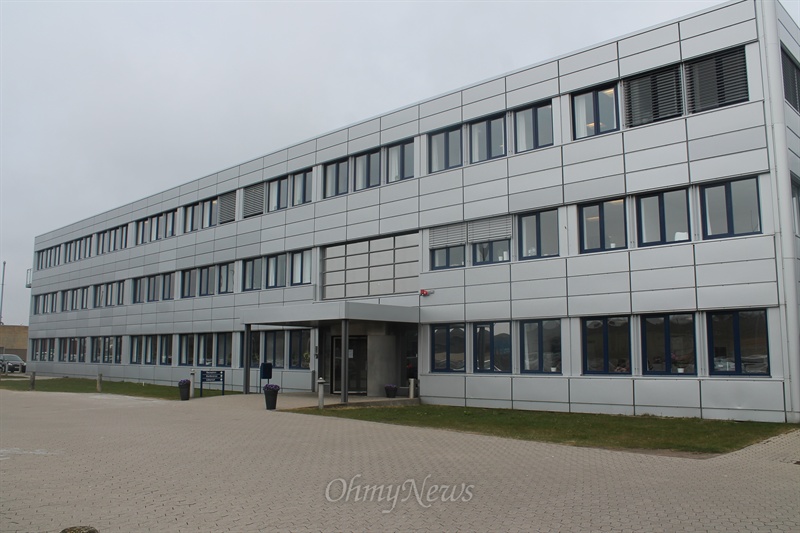
▲ The front photo of Roche Denmark - The greatest place to work in Denmark 2012. Located near Copenhagen, the building's architecture is rather plain.
(This article is No. 8th of a serial reporting about <Secret of Danish Happiness> written by Yeonho Oh who is a Founder/CEO/reporter of OhmyNews........editor's note)
Roche Denmark is located in Hvidovre, near Copenhagen. The building's architecture is rather plain. It is a simple and clean three-story building with a not-so-impressive garden. However, this Roche Denmark, an affiliate of global Roche corporation, received a very special award in 2012. It was recognized as the No. 1 Best Workplace in Denmark. This is a prestigious award given by a global organization called the Great Place to Work Institute. Roche Pharmaceuticals employs about 100 people, including pharmacists, sales and marketing people, and more. It ranked No. 6 in 2006 on the same survey, but within 6 years, it has risen to the top.
While I was waiting for my visitor's pass at the front desk of Roche Denmark, I started wondering, "I am entering a god-given workplace, a workers' paradise. Since Denmark is happiest country in the world and this is the greatest place to work in Denmark, this must be the happiest workplace in the whole world. What makes this place so special?"
I cleared my head to stay more focused than usual. I wanted to figure out whether I could apply what I learn here to companies in Korea as well as to Oh My News.
▲ A God-Given Workplace, Roche Denmark ⓒ 오연호
Company prepares dinner for employee's families?
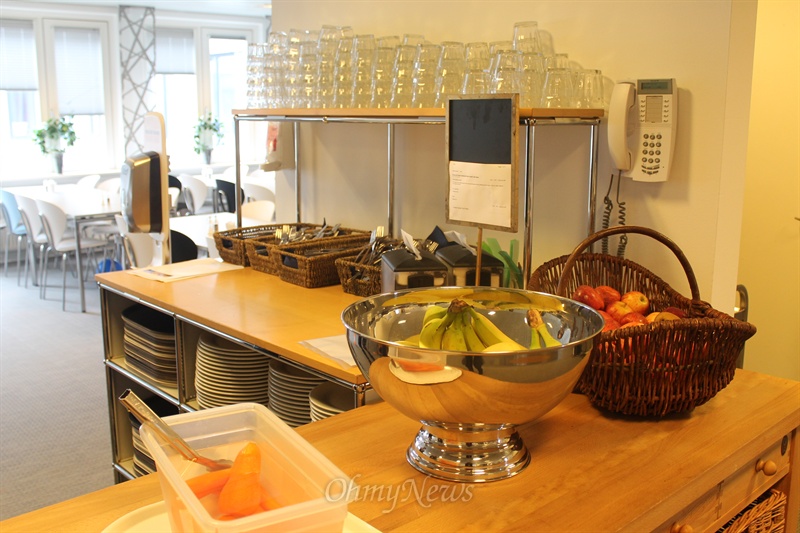
▲ Cafeteria on the first floor. "We only use fresh ingredients for our employees' health. We prepare fruits here so that our employees can eat them anytime."
I was guided to the room of HR Director Linda Vestergaard. She has been working here for 25 years. She welcomed us – the three members in my research team – and asked us to sit down. On the table were coffee, grapes, strawberries, and other fresh fruits. It impressed me quite a bit. It may not have cost much, but I could feel the caring heart.
I thanked her for the fruit. Linda said, "It is not just for guests. Our employees eat fresh fruits like these every day." It turned out that the company offers breakfast and lunch to all the employees every day at a very reasonable price. I stopped by the cafeteria on the first floor and the kitchen worker told me, "We only use fresh ingredients for our employee's health. We also prepare fruits here so that people can come to eat anytime."
Well, I thought that was not too impressive. After all, this is the greatest workplace in Denmark, so such service is to be expected. But what Linda said next gave me a pleasant surprise.
"We prepare take-away dinner for our employee's families twice a week."
- "What? Even for families?"
"Yes. If you have four members in your family, you can take four dinner boxes home. We have kid's meals, too."
Wait a second. People in Denmark normally arrive at the company at 7am or 8am and leave at 4pm or 5pm. The workday is minimum 7.5 hours long, and lunchtime is [another?]30 minutes. So they spend an average of 8 hours at work. So, here at Roche, too, the employees leave around 4pm or 5pm. In my mind, that is a fairly early time for dinner. Why does the company prepare dinner for their employees? And for their families even?
"Think about it. After work, you buy groceries, go home, prepare dinner, and wash dishes. That will make you exhausted. Female workers with children have an especially harder time. So, we provide for our employees so that they can have more relaxed time at home. We have been providing the dinner program for six years now. It is very popular since it is healthy and delicious."
I talked to Mads Ekstrand-Olsen, who has been working at Roche for five years. He has four children and has been making great use of this dinner program.
"There are six of us in my family. So I take six dinner boxes. My wife is a nurse and she loves it when I bring dinner home. It takes so much time to prepare food for the kids and us. Bringing dinner home frees us. It is only twice a week, but we like it very much."
Another female employee who is single also praised this dinner program. "When dinner is provided, I eat three meals at work. It makes things easier and I can focus better on work."
Handling dry-cleaning and postal service at work
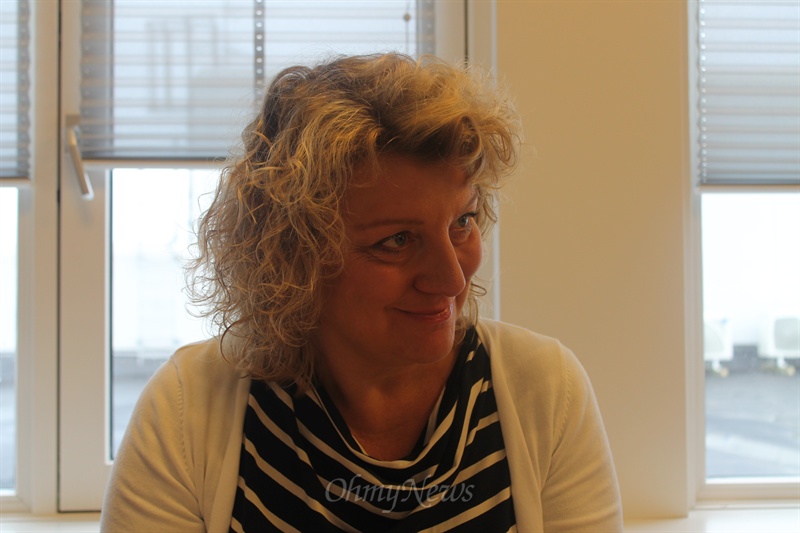
▲ Linda Vestergaard, HR Director, has been working for Roche Denmark for 25 years.
Roche Denmark offers many remarkable services for their employees so that they can focus on work. The dinner program is merely one of them.
Can you believe that you can drop off and pick up your dry-cleaning at work at a usual price? Can you believe you can take care of your post office errands at work? Here, listen to HR director, Linda.
"When you have clothes for dry-cleaning, you can drop off and pick up at work. Also, you can send mail from work, too. We offer these services so that people don't waste their time running errands and get stressed out."
That is not all. They allow their employees to use their company cars for private vacations. Employees at Roche officially get six weeks of vacation time. Mads said he was planning a summer vacation to other countries and he would drive his company car.
"Many employees have to travel for work. So about 70% of our employees have company cars. This company car is used for work. But it can also be used for private use, including family vacations. We can drive to other countries, too. I am planning to visit Croatia this summer and I will drive my company car."
It was quite interesting to hear that the company allows its employees to use company cars outside of the work, , even to drive to other countries for family vacations. As we can see from the dinner program, dry-cleaning, and postal service, Roche puts a lot of effort into the welfare of the workplace as well as that of employee's home life.
I asked Linda. "Why do you do that? Is it because you think when your employees are happier, they will work harder?"
"Yes, that is right."
Linda added that they are using a flexible work hour system to balance work and home. As in a typical pharmaceutical company, female workers make up 70% of the employee pool at Roche Denmark. Therefore, they give a lot of considerations to their working mothers. Paid maternity leave in Denmark is one year. The company pays the full salary to the mother from one month before delivery till six months after delivery. Then the government pays salary compensation for the next five months.
"After the baby becomes one year old, some moms use additional maternity leave, but most of them return to their work and leave their kids at day care centers. In this case, parents can decide their work hours flexibly. For example, mom takes the kid to the day care, goes to work around 9am, and finishes work at 5pm. Meanwhile, dad works from 7am to 3pm so that he can pick up the kid after work."
Why did Mads decide to have four children?
Roche Denmark supports flexible work hours. So people's work hours vary.
"Some moms leave work early and work at home after they put their children to sleep. Also if I ask, 'My kid is taking a tennis lesson at 3pm, can I leave around 2pm?" they let me. Then I get to work at home later."
I asked Mads, who has four children, why he has so many when the average birthrate in Denmark is 2.0. He said it is thanks to flexible work hours. He said, "I normally get up at 6:30am, arrive at work at 7am, leave my office at 4pm, and take care of my kids." They say Danish guys are handsome. I found Mads a perfect example.
I asked him, "Denmark is considered to be the happiest country in the world. And Roche is the greatest workplace in Denmark. So, it must be a paradise. I figure you must be happy. But do you have any concerns, too?"
"I am concerned for my health and my children. I wonder whether they get along well with their friends at school…"
He considers raising children his responsibility, too, not solely his wife's. He leaves work at 4pm without any reservation. What will it take to make Korean fathers feel the same?
Roche Denmark offers another wonderful benefit. They pay lots of attention to the health of their employees. They offer a spinning class on Mondays, an aerobic class on Tuesdays, and a running club on Wednesdays. About 35% of Danish people commute by bicycle. So, a company of a certain size must equip a shower room. Roche is equipped with three shower facilities.
Monthly feedback between managers and employees
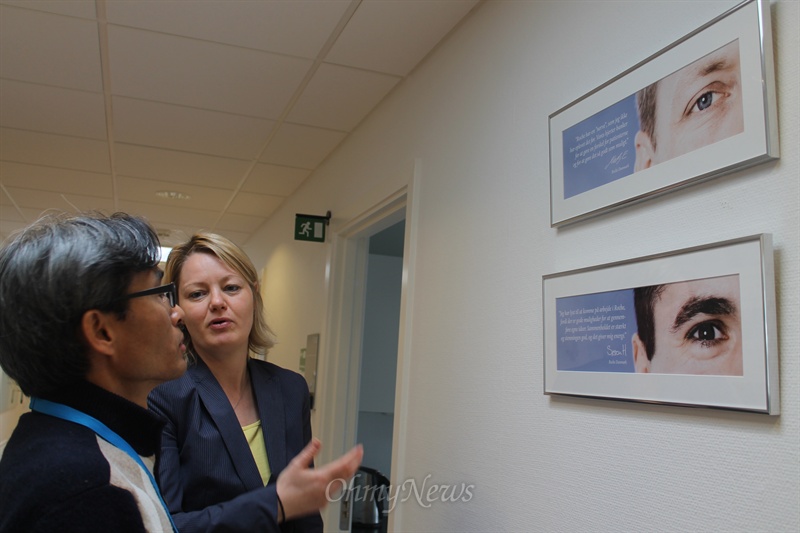
▲ Framed photos stating company's vision and values displayed on the walls. The subject of these photos are not the president or executive directors but regular employees.
Are you envious? Doesn't it sound like a great workplace? But what I have stated so far is not the core reason for what makes Roche Denmark the greatest workplace in Denmark. The secret was not something costly. It was something Korean companies can also do if they wish.
"Your company ranked No. 6 on the Best Workplaces in Denmark list in 2006, but you won first place in 2012. What made that possible?"
"Part of the reason why We became No. 1 is that we implemented monthly feedback sessions. We set up a monthly feedback session for managers and their employees. This way, everyone can have a clear idea on how he or she is doing. Its effect was enormous. Through mutual feedback, people get to understand what to improve and what to focus on."
Linda claims that people are very proud of the company because of all the products which makes a significant change to patients' lives. That is, the reason that Roche Denmark became the best workplace is through the success of internal and external communication. How did it happen, exactly?
"Firstly, we share our vision and values," said Linda.
"Our company has three values: integrity, courage, and passion. These values are the basis of everything we do. We have worked to implement these values for years. We conducted conferences and seminars. We had theater plays casting our own employees as actors. We set up our vision and goals based on these values. We have worked really hard to leave nobody behind."
Leave nobody behind from sharing the company's vision and values! Is that the reason? I saw many framed photos with text explaining company's vision on the walls of various hallways. The photos were of the faces of not the company's owner or executives but regular employees. They made close-up photos of people's eyes and printed what that person says about the company values. They are very impressive.
"Leave every door open" – Conversing without authority
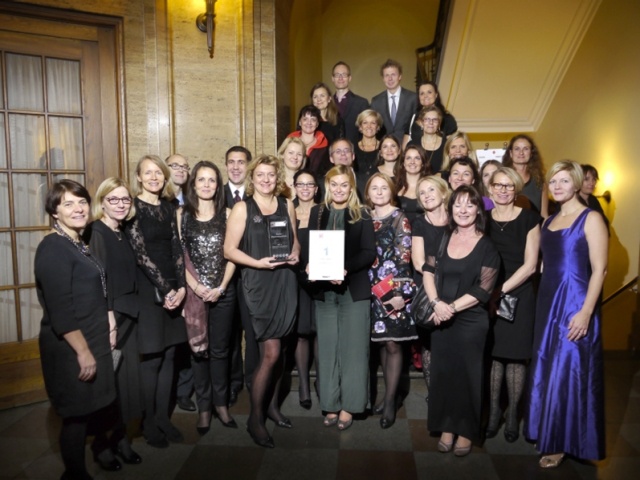
▲ Award Photo. Roche Denmark won first place on Great Place to Work in Denmark list in 2012. ⓒ Roche
Secondly, they offer a communication channel where everyone can participate informally.
"Our General Manager (GM) frequently invites all workers for a 30-minute town hall meeting. In this meeting, everyone can talk about new approaches and problems. And twice a year, we have a three-day conference with all the employees at a place outside of Copenhagen. Everyone, including front desk person and kitchen workers, participates. Here we report the current status of the company and share our vision."
Linda considers informality as the main characteristic of Roche Denmark's internal communication. Roche has an Open Door policy. About 100 employees have their own individual offices with their door open. As people walk along the hallway, they can see who is doing what. The company provides individual rooms to its workers for better concentration but asks them to leave the door open for internal communication.
Linda pointed out the rooms. "Look here. The GM, executive directors, and regular employees, they all leave their door open. Anyone can walk into the GM or any other director's office. This way, we can solve our problems quickly."
I commented, "I think that if a regular employee walks into the GM's office to solve problems, people in middle management may not like it."
"Of course, employees should try to consult their managers first. But if they have a concern regarding the company vision, can't solve the problem even after talking to their managers, or want to get the GM's feedback on their current project, they can walk into the GM's office anytime."
Thirdly, Roche Denmark didn't stick to one method to keep communication smooth. Instead, they implemented various methods.
"We implemented various methods since people have different preferences. When we have a message to inform, we list it on a website bulletin board and send out emails. Also, we put it up on a notice board in the analog way."
As I looked around the office, I noticed that one team had hung a huge blackboard that displayed the logistics and schedules of the team members for the week. One employee listed, "I need to leave the office at 2pm on Wednesday due to my child in kindergarten." In this way, members can understand what is happening and figure out what is most effective.
The country that shares the same values in schools, society, and companies
So, what made effective communication possible within Roche Denmark? My temporary conclusion is this. In Denmark, what people learn in school works in society, and what works in society works in companies! Please keep in mind the six elements of Danish happiness (freedom, security, equality, trust, neighbor, environment) that I mentioned in the first article of this series.
I commented, "Many Danish people picked 'trust' as one of the key elements to Danish happiness. I think trust must be the basis of your successful communication."
"That is right. Trust between managers and their employees and amongst the colleagues is really important. That is the prerequisite for a great workplace."
Linda added that Roche Denmark's successful communication could be understood more easily in the frame of Danish culture.
"This trust is linked to Danish culture, which emphasizes, 'Nobody is special, everyone is equally important.' (Yante Law, please refer to the article #7) In Denmark, the company president is neither special nor a subject of unconditional respect. She is a little different because she makes decisions. That is it."
In other words, the sense of equality is deeply rooted in Danish culture. So, informal communication within a company can happen naturally.
Linda is married with two children. As a director at the greatest workplace in Denmark, she is undoubtedly a very successful career woman. So, I asked her this.
"When you go to reunion or other gatherings, do your friends envy you?"
She instantly said, "No."
"Those who want to work, work. Those who want to be housewives become housewives. It is the matter of choice. A company executive is not special. Most Danish people chose the life they are living, so they don't envy me just because I am a company executive."
I asked the same question to Mads.
"If you have friends from junior high who are, let's say, carpenters or taxi drivers, would they envy you?"
"Pharmacist is an important profession. But both carpenters and taxi drivers are important, too."
HR coordinator Anja Grjelstrup Kjaer elaborated on this.
"Denmark is a country that doesn't allow discrimination. For example, public schools are free, while private schools are more costly. The state however covers a large part of the price, so many parents are able to send their kids to private schools, if they wish so. Since the country has a solid safety net of health and welfare systems and fulfills the basic needs of its citizens, people in Denmark don't envy their friends for having a better job or making more money.
What impressed me further is the fact that the high earners of this company pay 60% income tax without any complaints. They seemed proud that their tax contributed to build Denmark as a happy country.
Mads said,
"Denmark is a worry-free country. My friends, other people, and I don't have to worry about medical expenses. All of us can get free medical treatment and stay healthy. Isn't it wonderful?"
Like this, he emphasized the good for "us" instead of "me." It made me wonder. One of the core values of this company is "passion." Where is that passion coming from? They can't boast about their successful career. When they make more money, they pay 60% income tax. So, what motivates them to work hard?
Mads explains it like this.
"My passion comes from working with gifted colleagues for a good cause. For example, I am currently developing a new product to treat a little segment of skin cancer, only about 50 patients in Denmark each year. Isn't this so meaningful?"
After about a two-hour interview, I asked Linda, the HR director, a few more questions.
- So, are you happy at this company?
"Yes, I am happy."
- How do you judge whether you are happy or not?
"I think I can judge by observing whether I feel glad to come to work in the morning. It is important to feel that I want to go to work and start my job early. It is very rare that I feel I don't want to come to work. (laugh)"
Roche Denmark is not a special case in Denmark. In 2010's survey conducted by OECD with its 27 member countries, Denmark ranked No. 1 in Life Satisfaction and No. 2 in Job Satisfaction. On the same survey, Korea ranked No. 27, the very last, in Job Satisfaction and ranked No. 26, barely escaping last place, in Life Satisfaction.
My readers who are reading this article, Do you feel happy in the morning going to work?